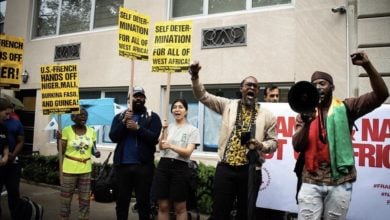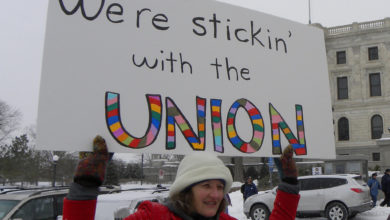On July 7, 1950, 12 days after the launching of the Korean War, FBI director J. Edgar Hoover sent a plan to the White House to imprison without due process 12,000 radicals in the United States. The State Department released details of the plan as part of a collection of documents declassified on Dec. 21, 2007.
Hoover’s mass internment plan reveals the depth and detailed execution of the anti-communist crusade during the
|
Hoover recommended that in the event of an “emergency situation,” the FBI be granted a “master warrant” for the arrest of radicals in the index. Further, the arrestees would be denied habeas corpus—the right to seek relief from illegal detention. While the U.S. Constitution allows for such a suspension only in the case of foreign invasion of the United States, Hoover stretched that definition to include attacks on U.S. troops on “legally occupied territory.” In short, Hoover offered a legal foundation for mass arrests of dissidents whenever the United States launches a war.
Arrested radicals would be taken to federal detention facilities except in New York, San Francisco and Los Angeles. There, Hoover wrote, “arrangements have been perfected with the National Military Establishment for the temporary and permanent detention in military facilities.”
Hoover has since become infamous for his deadly Counter Intelligence Program (COINTELPRO) against the left and the Black liberation movement in 1960s. In popular culture, the “excesses” of the anti-communist witch hunt are often laid at the feet of Hoover, Sen. Joe McCarthy or the House Un-American Activities Committee in the 1950s.
The Patriot Act, passed 45 days after Sept. 11, 2001, expanded terrorism laws to include “domestic terrorism,” which allowed for surveillance, wiretapping and harassment for political advocacy. It allowed the government to conduct secret searches, gave them legal authority for phone and Internet surveillance, and access to highly personal records with minimal judicial oversight. The Act permits non-citizens to be jailed based on “suspicion” and denied re-admission to the United States for free speech activities. Suspects in the “war on terror” have been held indefinitely in military installations and tortured. In total, the Patriot Act violates no less than six of the original 10 amendments of the Constitution.
But the 342-page Patriot Act, like Hoover’s 1950 plan, was written in advance of an “emergency situation.” Regardless of which party is in office, the tendency toward repression and the curtailment of civil liberties remains in the central organs of the capitalist state.
Both Reagan and Bush I drafted proposals that would bring back guilt by association, association as grounds for exclusion or deportation, the use of secret evidence and the empowerment of the Secretary of State to unilaterally designate groups as terrorist organizations. But Congress rejected these reforms on constitutional grounds. There was not then the domestic political climate to justify the increased authority of the state.
In historical view, the current Bush administration is not a renegade administration whatsoever. It is simply fulfilling the wish list of prior presidencies.
The Senate soon will be taking up House Resolution 1955, the Violent Radicalization and Homegrown Terrorism Prevention Act of 2007. Proposed by Rep. Jane Harman, a Democrat from Los Angeles, Calif., the bill amends the existing Homeland Security Act to include individuals born, raised or based in the United States.
The bill would create a government program to prevent “homegrown terrorism”: the use, planned use, or threatened use of force by an organization to promote its political, religious, or social beliefs. While the bill does include language to guarantee the protection of constitutional rights, we know what happens when the FBI and Justice Department are left to monitor the legality of their own actions. The bill already passed the House with a vote of 404-6.
Whether it takes the form of mass internment, individual assassinations, illegal roundups or kangaroo courts, the suspension of political rights and civil liberties clearly is not an exception to capitalist rule. Nor are they expressions of paranoia from one or another representative of the state.
Hooverism, McCarthyism, the Patriot Act, HR 1955: these are inevitable outgrowths of a system built on the domination of a tiny minority over a large majority. The revelation of the Hoover plan should not be cause for pure historical reflection. It is a call to overturn that system.







